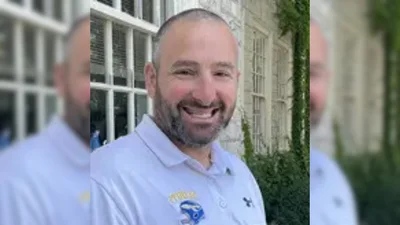Gov. Bruce Rauner recently signed juvenile justice reform bills that will reduce the mandatory minimum lengths of probation for juveniles and allow a juvenile to immediately petition a court for expungement of an offense that is dismissed without a finding of delinquency.
The bills were a surprising act of bipartisanship for both Rauner and the Democratic-controlled General Assembly.

Martin Blumenthal
| Contributed photo
Martin Blumenthal, the Republican candidate for the District 58 State House seat, is familiar with the juvenile justice system, as he has served as a defense attorney for several youths.
“I’ve represented juveniles in criminal matters,” Blumenthal told the Lake County Gazette. “I definitely believe that some youths – at least the ones I have represented – have a good chance of leading very productive lives. As a matter of fact, I believe one or two of (those I represented) have. We did get their records expunged when they reached majority age, which is 18, so I am definitely for that.”
One bill signed by Rauner allows youths to immediately initiate the process of expunging their records if their offenses were dismissed by the court. Rauner described the bill as a step toward helping people start anew and get a second chance. Blumenthal agreed with Rauner, but also said redemption should be considered on a per-person basis. Blumenthal also has had experiences with juveniles whom he believed to be dangerous.
“There are some juveniles…they have serious problems,” Blumenthal said. “They are very violent despite their age. They should be kept locked up and treated if possible, but it should be on an individual basis. But for non-violent juveniles, definitely (give them a chance). They don’t deserve to be branded with a felony for the rest of their lives. I think most of them would benefit from one more chance.”
Providing a chance at a better life to at-risk youths encourages them to contribute to their community and become responsible adults. Incarceration merely costs the state in bureaucracy and added expense. Illinois spends $172,000 a year to incarcerate a youth. Blumenthal said that merely sending non-violent youths to prison only exacerbates the situation.
“Usually, for nonviolent offenders, for them to go into prison – especially if they are tried as adults – they rarely get better,” Blumenthal said. “Prison is like a college course for them. They usually come out with new skills taught to them by their older roommates. So it could be counterproductive.”
Blumenthal said the entire criminal justice system needs re-examination, but again called for giving youths a second chance, if possible, especially for non-violent offenses.
Giving youths a chance at education is also important to Blumenthal, which is why he has said the Common Core curriculum is ineffective, and many states share this view. Between 2011 and 2016, states participating in Common Core tests dropped 55 percent, from 45 states involved to 20.
Blumenthal said Common Core is unfair to some students.
“My daughter is a sixth-grade teacher, and she explained that Common Core is not liked because it doesn’t account for the individuality of the student,” Blumenthal said. “She has a lot of students who have problems with English…so she feels that it is certainly unfair for her students that they are being against a standard to every student.”
Blumenthal also said the state’s endorsement of Common Core supplants school districts' own judgments on education.
“It also takes the discretion of the local school district to decide how they want to educate their students,” Blumenthal said. “(My daughter) said that questions are very difficult. It goes way beyond what would be typical for the average student to answer. So really, it doesn’t measure anything.”
Blumenthal said teachers don’t like the system because it puts them under pressure to ensure students pass Common Core exams for which their curricula aren’t designed. Blumenthal said the federal government should stay out of education and that it should be up to the state and local districts.
“(Teachers) don’t like it,” Blumenthal said. “They don’t like being told what to do by the federal government.”
Blumenthal wants the state to control education.
“There should be no Department of Education in federal government,” Blumenthal said. "We have the local school districts who answer to the parents. If the parents feel that their kids aren’t getting an education, (the districts) will hear about it. The federal government should keep its nose out of education.”






 Alerts Sign-up
Alerts Sign-up